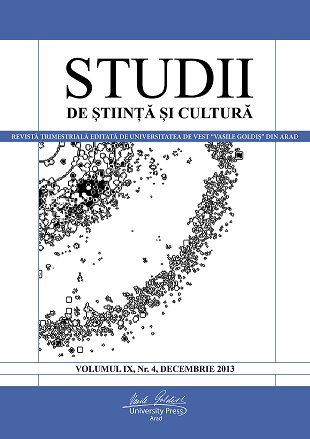V. Teleucă: eul poetic între comuniunea gândirii şi gestul metafizic
V. Teleucă: The Poetic Ego between the Communion of Thought and the Metaphysical Gesture
Author(s): Timofei RoşcaSubject(s): Literary Texts
Published by: Editura Universităţii Vasile Goldiş
Keywords: Keywords: metaphysical; hermeneutic; ontological; lirosofie. Mots cles: métaphysique; herméneutique; ontologique; lyrosophie. metafizic; hermeneutic; ontologic; lirosofie; metaphysical; hermeneutic; ontological; lirosofie; metafizic; hermeneutic
Summary/Abstract: Visionary spirits are usually reformatory. Their incommodity is found not only within the cultivated art genre, but within the entire realm of culture that is pervaded by thinking. Obviously, creative man is counting on hisprominent skills. In what refers to the Bessarabian poet, Victor Teleuca we deal with the poet-philosopher and philosopher-poet. The two vocations are in intrinsic unity and communion. He is the author of the book "It is snowing at the edge of existence” as well as of other famous books. He did not create a philosophical system like L. Blaga did. Instead, he showed a bold metaphysical thinking, now prone to break barriers of hermeneutic philosophy, to shake the traditional ontological positions. His philosophy operates with contradictory notions and categories that are deconstructive in Derrida’s spirit: non-existence, non-I, silence understood not even as meaning like with L. Blaga, as "light" sparked from darkness dispute "is like a goal without a goal". It becomes a kind of study in its own "foundation", just as the self is not just an "experiment" as Nacamura claims, but self-patience: “I endure myself as I am." For V. Teleuca forever "is something that does not exist." The self has its" shadow" which is always missing. The linguistic philosophy is not preferred to the study of the "shadow". Like existence in general, which cannot distance from itself, the poetic self, contrary to Socrates’ philosophy, can see "itself, via itself, in itself." The big question of the philosopher V. Teleuca remains not "what is a man?" so and his self, like with Holderlin commented by Heidegger, but "why does he exist?”
Journal: Studii de Ştiinţă şi Cultură
- Issue Year: IX/2013
- Issue No: 04
- Page Range: 39-44
- Page Count: 6
- Language: Romanian

